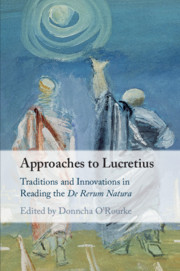Book contents
- Approaches to Lucretius
- Approaches to Lucretius
- Copyright page
- Contents
- Figures
- Notes on Contributors
- Preface
- Abbreviations
- Introduction
- Part I The Text
- Part II Lucretius and his Readers
- Chapter 2 Reading the ‘Implied Author’ in Lucretius’ De Rerum Natura
- Chapter 3 Common Ground in Lucretius’ De Rerum Natura
- Chapter 4 Coming to Know Epicurus’ Truth: Distributed Cognition in Lucretius’ De Rerum Natura
- Part III The Word and the World
- Part IV Literary and Philosophical Sources
- Part V Worldviews
- Works Cited
- Index Locorum
- Index Rerum
Chapter 4 - Coming to Know Epicurus’ Truth: Distributed Cognition in Lucretius’ De Rerum Natura
from Part II - Lucretius and his Readers
Published online by Cambridge University Press: 25 June 2020
- Approaches to Lucretius
- Approaches to Lucretius
- Copyright page
- Contents
- Figures
- Notes on Contributors
- Preface
- Abbreviations
- Introduction
- Part I The Text
- Part II Lucretius and his Readers
- Chapter 2 Reading the ‘Implied Author’ in Lucretius’ De Rerum Natura
- Chapter 3 Common Ground in Lucretius’ De Rerum Natura
- Chapter 4 Coming to Know Epicurus’ Truth: Distributed Cognition in Lucretius’ De Rerum Natura
- Part III The Word and the World
- Part IV Literary and Philosophical Sources
- Part V Worldviews
- Works Cited
- Index Locorum
- Index Rerum
Summary
Until recently, Descartes’ idea that the human mind is, by definition, a non-extended entity, enclosed in the body but constitutionally different from common bodily and external realities, found wide acceptance among students of cognitive sciences. But in the past few years the barriers between outer and inner worlds have begun to blur, projecting the process of cognition as a complex distributed phenomenon. The case of Lucretius and Epicurean philosophy discussed in this paper aims to show that the narrow fortress of the knowing self is not as ancient as some present-day theorists are inclined to think, and that the very concept of distributed cognition, broadly construed, has a history of its own with deep roots in Greco-Roman physiology. Lucretius’ poem provides especially compelling evidence that, on the one hand, Epicurean epistemology conceives of cognition as a material process extended across the borders of atomic bodies, and that, on the other hand, true knowledge can be achieved only through cooperative didactic techniques. Standing at the crossroads between poetry and philosophy, Lucretius’ didactic method tries to involve the addressee (both intellectually and emotionally) in the cooperative construction of an internalized cognitive artefact: the image of the atomic cosmos, faithfully reflected in the text.
Keywords
- Type
- Chapter
- Information
- Approaches to LucretiusTraditions and Innovations in Reading the <I>De Rerum Natura</I>, pp. 80 - 100Publisher: Cambridge University PressPrint publication year: 2020
- 1
- Cited by

